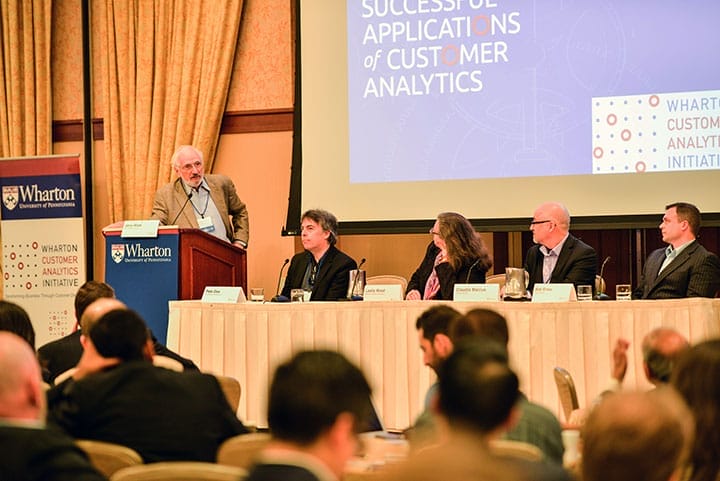If only one item of note came out of the Wharton Customer Analytics Initiative (WCAI) spring conference, it was this: Keynote speaker Tom Davenport, Babson College professor and co-founder of the International Institute for Analytics, declared that it’s time to move past the term “data scientist” (for which there certainly is a craze in analytics circles).
“Maybe you heard it here first,” said Peter Fader afterward. “We need more than one-size-fits-all terms.”
The conference itself offered more than those terms—and more than one man talking about those terms. The event offered three overarching themes, according to Fader, academic co-director of the WCAI and Wharton’s Frances and Pei-Yuan Chia Professor:
Transitions
Just as the WCAI itself has evolved from an insular, academic endeavor to an initiative that engages with industry and students, customer analytics as a field has matured in the span of only a few years. It’s not just for geeks and nerds to experiment with. Presidents and CEOs of organizations know the value of big data and are “actively interested in seeing these things through,” said Fader.
It showed at the conference.
“Here we’re focusing much more on implementation,” said Fader.
Bridge Building
With a focus on implementation, the WCAI event involved practitioners more than ever. Not only does Fader see bridges being built from industry to academia; he sees them crossing silos within organizations, as well as spanning industries—from finance and health care to hospitality and sports.
“Owning it”
At the WCAI conference, Fader and other attendees listened to practitioners who are building expertise within their own organizations. Such a company as Pfizer, whose representatives spoke at the WCAI event, is seeking analytics ideas from the outside, in order to bring them inside and absorb them.
In industry, Fader said, analytics projects are not viewed as “one-shot deals.” They are iterative affairs, with each subsequent version expected to be bigger and better.
Customer analytics as a whole is no longer viewed as an experiment, as these three trends suggest. The cross-disciplinary bridges and practitioner ownership of projects speak to a strategic relevance for analytics that goes beyond the pop obsession with “data scientists.” And if you believe in the value of analytics—to provide new and better information to inform business decisions—then you understand, as Fader does, that businesses will only benefit the more they embrace it.
The WCAI Successful Applications of Customer Analytics conference took place at the Inn at Penn on Thursday, May 1. Fader hosted the event with fellow WCAI Academic Co-Director, Eric Bradlow, who also serves as the K.P. Chao Professor and vice dean of Wharton Doctoral Programs.

























